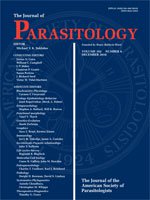The grass shrimp (Palaemonetes pugio) is a staple prey species in the diet of many ecologically and economically important species such as blue crab and striped bass and is commonly infected with a trematode parasite, Microphallus turgidus. To complete its life cycle, M. turgidus must be consumed as a metacercaria by a bird or mammal definitive host. Previous research has found that infected grass shrimp behave more conspicuously than uninfected shrimp around predators, which include mummichogs (Fundulus heteroclitus). In addition, grass shrimp are more likely to avoid predation when they have access to coarse woody debris (CWD). Aquaria experiments revealed that uninfected shrimp significantly reduce the amount of time spent swimming in the presence of a fish predator, whereas infected shrimp did not exhibit this predation avoidance behavior. Uninfected shrimp also increased predator avoidance behavior (“backthrusts”) in the absence of CWD, whereas infected shrimp did not. These findings suggest that M. turgidus does not influence grass shrimp usage of CWD, but it alters shrimp swimming and backthrust behavior, thereby rendering infected shrimp more susceptible to predation. The implications of increased predation by a fish (nonhost or possible paratenic host) versus by a bird or mammal (definitive host) for parasite transmission are discussed.
How to translate text using browser tools
1 December 2016
Influence of a Trematode Parasite (Microphallus turgidus) on Grass Shrimp ( Palaemonetes pugio) Response to Refuge and Predator Presence
Sara T. Gonzalez
ACCESS THE FULL ARTICLE

Journal of Parasitology
Vol. 102 • No. 6
December 2016
Vol. 102 • No. 6
December 2016




